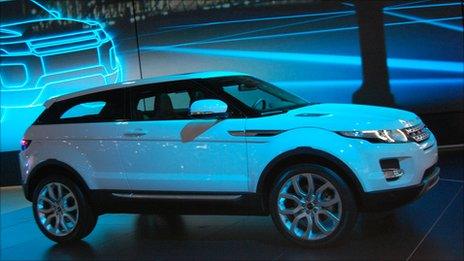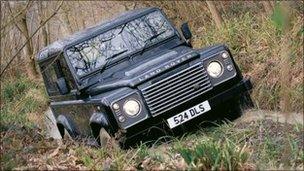Evolving Land Rover mulls Defender's future
- Published

Land Rover's expanding model range is increasingly skewed towards urban drivers as the company aims to grow global sales dramatically
Towering over his fellow executives, Carl-Peter Forster stands straight, surveying the crowd of photographers and reporters, before turning off his mobile phone.
The veteran motor industry executive has launched many cars in his career, but rarely have they been as important as the ones he has been overseeing at this year's motor show in Paris.

The Land Rover Defender is known for its cross-country prowess rather than comfort and refinement
As chief executive and managing director of the Indian carmaker Tata Motors, Mr Forster is also effectively in control of its UK subsidiary Jaguar Land Rover - a carmaker as renowned for its capable 4x4 models as for its luxury saloons and convertibles.
But as the covers come off its latest models - the Range Rover Evoque and an electric hybrid Jaguar getting additional power from small jet engines - there is a strong hint at an ever-bigger push towards youthful opulence and lifestyle choices.
Mr Forster is preparing to expand Jaguar Land Rover's model line-up by 50% in the years ahead, whilst also expanding the company's global presence.
"We are already running a bit faster," Mr Forster says.
So expect less farmers' field and country manor; more urban fashion and executive road warrior.
A new Defender?
As Land Rover evolves into a manufacturer of fashionable lifestyle cars, as opposed to a maker of practical work tools, it seems even the future of its sturdy Defender could be up in the air.
"It's decision time now," says Mr Forster, as he is getting ready to decide whether to continue producing the rugged 4x4 vehicle.
"We must decide whether to have a successor or not."
Axing the Defender would be seen as heresy by the agricultural vehicle's many and diverse fans.
Though popular as a working vehicle, the Defender also appeals to plenty of young women in fur coats, men in pinstriped suits or wealthy gentlemen farmers, Mr Forster says.
"We are aware of the responsibility to make sure the national icon does not die," he says, quipping: "Or else we won't be allowed back into Britain."
Military market

Military buyers make up an ever-smaller part of Land Rover's business
But before a replacement is dreamt up, the company must decide what the vehicle's job should be.
"I think it's important for the brand to appeal to the military, even though most Land Rovers are sold to civilians," Mr Forster says.
Military contracts "showcase the capability of our vehicles" explains Land Rover's managing director, Phil Popham. "But as we grow it's a smaller and smaller part of our business.
"The whole nature of peace keeping has changed - you've got to have vehicles that protect people and Land Rovers are not designed to do that," Mr Popham says.
"We don't make vehicles that are designed to be in combat, and we don't intend to."
Late last month, the UK's Ministry of Defence announced it would replace its controversial Snatch Land Rover with the Ocelot, a better-protected vehicle.
Working vehicle
Another area where the Defender could build strong sales would be in Asia and South America, as rapid economic development in these regions is set to create both enormous demand for commercial vehicles, as well as the greater ability to pay for them.

Mr Forster seems keen to keep the iconic Defender going, but he has yet to decide how
But in these markets, the Defender is up against a number of 4x4 vehicles that often offer better comfort and handling at lower prices.
Hence, in order to succeed in these markets, the 4x4 must be made cheaper, Mr Forster reasons.
"We have to take some cost out of the car," he says.
Loveable rogue
The Defender is increasingly looking like the odd one out, however, as new Land Rover and Range Rover models become ever more sophisticated, luxurious and comfortable.
When compared with modern Jaguars, the contrasts are even sharper, a point clearly illustrated by the carefully designed C-X75 petrol-electric hybrid supercar concept unveiled in Paris.
The car hints at not only sleeker design in the future, but also at an overtly green profile that aims to appeal to car buyers' concerns about emissions and the environment.
The agricultural Defender is none of those things, yet it is clear that Mr Forster remains fond of the beast.
In spite of - or perhaps because of - the fact that it is noisy, unrefined, awkward to manoeuvre and uncomfortable to drive.
"You know what?" Mr Forster grins. "People do not mind that much."